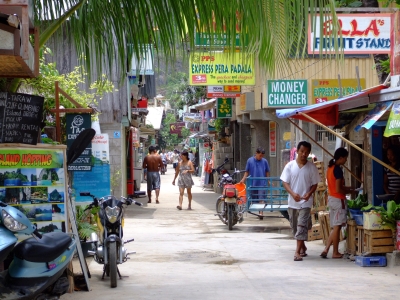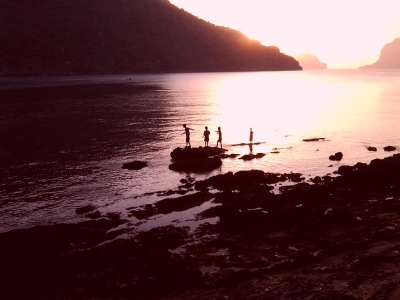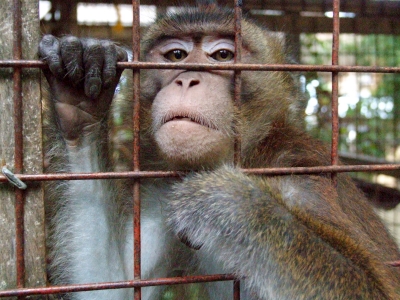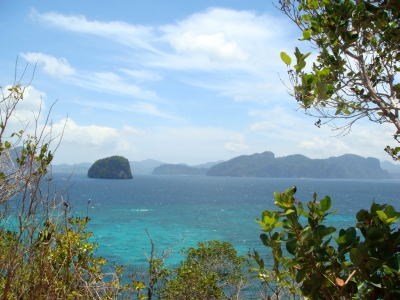Seeking The Final Frontier In Palawan

The silver rays of the rising sun creep between the limestone outcrops that dominate the tiny bay; darkness divides into long shadows that slide back up the dampened sands. Beneath the arching palms, all is harmonious. Then the peace of my wood cabin is shattered by an almighty clatter of corrugated iron and a banging of bars — my neighbors are awake. Far from being annoyed at the rude rousing, I can’t wait to go and see them. After all, it’s not every day you wake up next to a monkey enclosure.
I’d arrived two days previously in Palawan, the 15,000-square-kilometer island often referred to as the Philippines’ final frontier (although a country comprising 7,000-plus islands surely has countless uncharted corners). Finding little to detain me in the main town of Puerto Princesa — a concrete tangle of underlit and blaringly noisy streets — I board an air-conditioned minibus bound for the putative paradise of El Nido.
The journey runs smoothly until the road roughens and a rear tire bursts, leaving the dozen passengers — young backpackers from Europe, the U.S. and Canada — stranded under a baking midday sun, squinting around at the unrelenting jungle interior. The spare thankfully installed, we arrive after six long and winding hours to find our bags, strapped to the roof, white with dust. This place had better be worth it, I think grumpily.
 A few hours later in a bamboo beach bar lit by flaming torches, sipping a bottle of Red Horse and drinking in the crimson twilight enveloping the Bacuit Archipelago, the wearing journey is dissolving into the lapping tide. Even when the power supply cuts on cue at 7 p.m., generators keep the Bob Marley backing track flowing. The sun sinks, only to be replaced by the illumination of thousands of candles, carried by locals forming a parade through the silent streets. It’s Good Friday and in this largely Catholic country, they are hauntingly enacting the Stations of the Cross, effigies swaying on pickup trucks.
A few hours later in a bamboo beach bar lit by flaming torches, sipping a bottle of Red Horse and drinking in the crimson twilight enveloping the Bacuit Archipelago, the wearing journey is dissolving into the lapping tide. Even when the power supply cuts on cue at 7 p.m., generators keep the Bob Marley backing track flowing. The sun sinks, only to be replaced by the illumination of thousands of candles, carried by locals forming a parade through the silent streets. It’s Good Friday and in this largely Catholic country, they are hauntingly enacting the Stations of the Cross, effigies swaying on pickup trucks.
Settling down for the night, my window frames the brooding bulk of Cadlao Island across the bay, the stillness dense enough to carry the melodious sound of countless crabs picking over the rocks. A tuko lizard nearby clicks and croaks as a solitary firefly traces loops under a purple dome blazing with more constellations than I knew existed. Just as I’m thinking that this could be perfection, a falling star blazes its signature across the picture. A day that started inauspiciously has yielded one of my most cherishable travel experiences.
 Next morning I’ve got monkey business to attend to. The great attraction of staying at the Golden Monkey Cottages — a 10-minute stroll around the bay — is the chance to get familiar with half a dozen long-tailed macaques. When I returned last night they’d been “roosting” in the gloom since sunset, but in the hazy dawn light, having rattled me awake, I find them leaping around with feral energy, as curious about the newcomer as I am about them.
Next morning I’ve got monkey business to attend to. The great attraction of staying at the Golden Monkey Cottages — a 10-minute stroll around the bay — is the chance to get familiar with half a dozen long-tailed macaques. When I returned last night they’d been “roosting” in the gloom since sunset, but in the hazy dawn light, having rattled me awake, I find them leaping around with feral energy, as curious about the newcomer as I am about them.
The eight comfortably rustic cottages are the handiwork of British owner Kevin McCabe and his Filipina wife Rose. After settling in El Nido six years ago, they adopted a neighbor’s chained-up monkey as a pet, but soon noticed many more unfortunate animals trapped on distressingly short leashes as “mascots” outside local bars or restaurants (an odious practice likely to continue, despite my complaints to the tourist board). When the acquisitions mounted — they had soon rescued a dozen macaques — Kevin applied his 25 years of carpentry experience to building, there amid the cottages, an ingenious enclosure of partitioned anterooms opening onto a main area networked with ropes, poles and branches.
Whatever he lacks in animal care expertise, he more than compensates for in his obvious compassion for the creatures. Besides, it doesn’t take a naturalist to see that their behavior revolves around status. As we hand them their morning bananas and star apples, it’s clear that even with plenty to go around, the macaques would rather fight over food. They will thoughtfully examine everything within reach and apply themselves doggedly to problems — such as breaking out. They once cracked a rusty lock, only to be enticed back, rather too easily, with a handful of their favourite delicacy, pumpkin seeds.
Kevin stresses that this is not a zoo: His sole objective is to return the macaques to their rightful environment. He advises guests not get too close or annoy them by laughing, but it’s hard not to smile at their high-speed horseplay. Pancho and Seamus, two of the lower-ranked soldiers, make lightning grabs at my clothing. Lefty, who bosses the compound with alpha aggression, claws away the sand beneath his feet, apparently planning a tunnel, and sharp-eyed Pepe triumphantly chews a pen he pilfers from my pocket. Sweetie, at two years the baby of the group, sucks her thumb and is bottle fed daily; she slept with Rose and Kevin for a year after being acquired, and would wake them by prying their eyelids open. Mimi, another female, hisses jealously at any passing women. What we are looking at, of course, is human behavior stripped of the subtlety and social niceties. It’s endlessly watchable.
Tearing myself away to explore the town, I learn that until recently El Nido (“the nest” in Spanish) was a backwater community subsisting on a centuries-old trade in bird’s nest soup. The calcium-rich delicacy, made from the saliva nests of the tiny balinsasayaw swiftlets that inhabit caves throughout the archipelago, is highly prized in China where it is believed to improve everything from the digestion to the libido. A kilo of nests can command several thousand dollars; hence the stories of armed guards at cave entrances.
 For a closer view of the 45 Bacuit islands, I join a traditional bangka tour. Defying its spluttering engine, our captain Peton guides the outrigger to Pinagbuyutan Island for snorkeling before we clamber through Cadugnon Cave, have lunch at the Snake Island sandbar, pay our respects at the hallowed Cathedral Cave and finally wash up on the powdery-sand paradise of Pangalusian Island. Next day, I immerse myself in some scuba with the superbly organized Submariner Diving School.
For a closer view of the 45 Bacuit islands, I join a traditional bangka tour. Defying its spluttering engine, our captain Peton guides the outrigger to Pinagbuyutan Island for snorkeling before we clamber through Cadugnon Cave, have lunch at the Snake Island sandbar, pay our respects at the hallowed Cathedral Cave and finally wash up on the powdery-sand paradise of Pangalusian Island. Next day, I immerse myself in some scuba with the superbly organized Submariner Diving School.
Until three years ago, only a handful of travelers each year would discover such pleasures. The transformation came with a documentary by a French film crew; already there are some 200 beds in town. Stylish beachfront cafes and eateries are suddenly swallowing the beach, their pseudo-hippie ambiance — artful melanges of lime green walls, shaggy rugs, nara wood tables and organic menus — exerting a magnetic pull on daily busloads of henna-tattooed backpackers and wealthy Manileros.
The pace of development is also impacting on the locals; many families may regret selling their land cheaply (albeit willingly) to foreign investors. A few steps back from the fan-cooled idyll of the waterfront, the harsh economic realities of the rural Philippines remain apparent: A man sprawls drunk in the dust in broad daylight, a family has a furious public row, brandishing sticks at one another, a three-year-old boy tries to wrestle one of the family chickens from the jaws of a wild dog. The changes have benefited many, but also created parallel worlds of transient ease and seemingly permanent hardship.
Back on the sunny side of the line, six little faces await me expectantly, pleading with their eyes to help them escape their surroundings. Little do they know I’d gladly swap places with them and stick around a good while longer.

About the Author
 Carl Thompson has been writing for travel publications and guidebooks for many years, mainly with the intention of avoiding a proper job. For the full story of a misspent decade, please visit UKTravelWriter.co.uk.
Carl Thompson has been writing for travel publications and guidebooks for many years, mainly with the intention of avoiding a proper job. For the full story of a misspent decade, please visit UKTravelWriter.co.uk.
